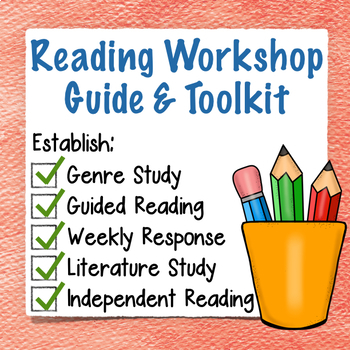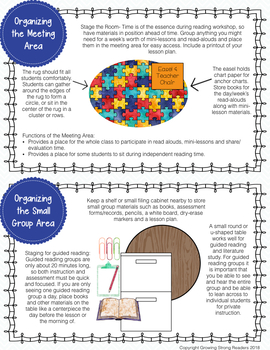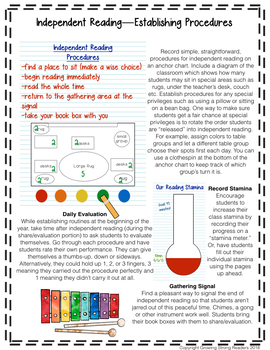Reading Workshop Guide & Toolkit: 55 lessons, First 20 Days Routines, Bundle
- Zip

What educators are saying
Products in this Bundle (10)
showing 1-5 of 10 products
Bonus
Description
A guide to help you implement an organized, informed, and effective reading workshop. Includes information and tools for instituting routines (first 20 days), independent reading, guided reading, literature study, genre study, conferences and book talks. A guide to standardized test preparation is also included.
Each section includes several pages of background information for the teacher, followed by resources for applying that information. See the table of contents at the end of the product preview to view everything included in the product.
Sections (click on the links to view individual products):
An detailed description of reading workshop—its purposes, components and relationship to reading content. Includes diagrams, descriptions of each component and suggestions for planning and organizing the classroom.
Includes: tags for book bags, tags for book baskets, book sign-out sheet, book waiting lists, teacher goal-setting sheet, book awareness sheet and parent letter.
The First Twenty Days
Mini-Lessons and corresponding materials to help you establish basic reading workshop routines (independent reading with a focus, reading conferences, book talks, updating a reading log, writing a weekly reading response and guided reading) within the first twenty days. For a list of included lessons, see preview.
Includes: 20 mini-lesson cards with example anchor charts, 20 extended lesson plans that correspond to the lesson cards and a blank mini-lesson planning sheet, student materials that correspond to the lessons.
Methods of establishing and structuring a daily independent reading time that corresponds to mini-lessons, read alouds, and other elements of reading workshop.
Includes: response bookmarks, student response sheets, stamina-meter (to track how long the class is able to read each day), individual stamina-meters, “Choosing Just Right Books” cards for students, “Abandoning Books” cards, teacher evaluation forms and rubric.
Reading Notebooks & Reading Response Materials
Ideas for organizing student notebooks that reinforce every element of reading workshop. Includes an extensive section on reading response that focuses on teaching students to write meaningfully about their reading each week.
Includes: notebook organization & assembly guide, notebook covers (3 choices), tabs (top and side), reading logs (four options, multiple sizes), “Books I Want to Read” list.
Materials for the response section of the notebook: response letter examples, format cards, response prompts (4 kinds: personal response, fiction response, nonfiction response, genre response), rubrics (3 kinds: basic response rubric, basic response letter rubric, extensive response letter rubric).
A guide to organizing and conducting one-on-one reading conferences with students.
Includes: teacher prompt sheet, teacher record sheet, and conference sign-up sheet.
Book Talks: Building a Reading Culture
A guide to helping students plan book talks to practice speaking about books and get reading ideas from each other. Also contains suggestions for other methods of book-sharing in place of book talks.
Includes: book talk sign-up sheet, book talk planning sheet (for students), book recommendation cards, classroom bibliography sheets.
33 Reading Behavior Mini-Lessons
A guide to planning mini-lessons based on curriculum goals and student needs along with 33 scripted mini-lessons that teach and reinforce good reading behaviors. These lessons are common-core aligned and list standards for grades 3-5. Like the first 20 days lessons, these can be printed out as cards and include sample anchor charts (for a list of the 33 lessons, see preview).
Includes: overview of mini-lessons, background information for the mini-lessons, 33 mini-lesson cards with example anchor charts, blank mini-lesson planning sheets, both large and small.
A guide to using genre study to plan effective and engaging read alouds. Includes extensive questioning guides by genre, plus 16 prepared read alouds (each of the 16 books from a different genre). The prepared read alouds are versatile and can easily be adapted to student/classroom needs.
Includes: overview of genres and forms (chart), genre study planning sheets, genre questioning guide (fiction), genre questioning guide (nonfiction), 16 prepared read alouds, read aloud planning sheet.
An overview of guided reading, its purpose, and what make it distinct from traditional reading groups. A planning guide for each component of guided reading is included. The planning guides include a reminder of the purpose of each component and a list of teacher and student behaviors. They can be used in conjunction with any book.
Includes: planning sheet "Introducing the Text", planning sheet: "Reading the Text", planning sheet: "Discussing & Teaching the Text", planning sheet: "Extending the Text & Word Work," level record sheet, note sheet, guided reading lesson plan sheet.
A guide to implementing interest-based literature study groups where students engage in discussion of rich texts. Includes strategies for helping students eventually lead these groups with little or no teacher assistance.
Includes: student sheet "Literature Study Roles", student sheet: "Participating in a Discussion", literature study bookmarks, student sheet: calendar of reading, student sheet: book preference, book sign-up sheet, teacher form: overview of groups, teacher form: literature study notes.
A guide to using reading workshop principles and routines to help students master standardized tests. Contains long-term strategies and a list of commonly tested concepts and how they can be taught throughout the year in each of the above reading workshop components. Also includes criteria tables to help students engage in multiple-choice question analysis.
Includes: guide to using criteria tables for question analysis, criteria tables for multiple-choice questions, summarization question criteria tables, vocabulary question criteria tables, main idea questions criteria tables, criteria table template, multiple-choice question template (write your own).
Additional Planning Resources
This section includes tips for outlining a year-long plan of genre study and reading workshop as well as an example outline.
Includes: teacher form: planning classroom arrangement, teacher form: readiness checklist, teacher form: monthly calendar, teacher form: At-A-Glance Calendars.
Also Included:
—Editable versions of 24 of the resources listed above (mostly teacher sheets, plus tags for book bags and book baskets).
—Powerpoint for displaying a reading focus along with each of the First 20 Days lessons.
Now that you know HOW to implement reading workshop, you may interested in these content specific products:
I am creating a series of genre units that include read alouds, mini-lessons and lesson extensions (guided practice). The lessons cover the common core and increase in complexity with each genre. Together they will form an in-depth, cohesive reading curriculum—perfect for the reading workshop classroom! The first four are available now:
Realistic Fiction Genre Unit (grades 3-4)
Realistic Fiction Genre Unit (grades 5-6)
Historical Fiction Genre Unit (grades 3-4)
Historical Fiction Genre Unit (grades 5-6)
Fantasy Genre Unit: Traditional Literature & Modern Fantasy (grades 3-4)
Fantasy Genre Unit: Traditional Literature & Modern Fantasy (grades 5-6)
Biography, Autobiography & Memoir Unit (grades 3-4)
Biography, Autobiography & Memoir Unit (grades 5-6)
SIGN UP for my newsletter to be notified when new genre units are available.
★★★★★★★★★★★★★★★★★★★★★★★★★★★★★★★★★★★★★★
Looking for other reading resources?
→Genre Study Perusing Guide (FREE)
→Text Structure Unit for Reading Workshop
→20 Mini Passages with Text Structure Graphic Organizers
→Genre Bookmarks & Graphic Organizers
★★★★★★★★★★★★★★★★★★★★★★★★★★★★★★★★★★★★★★
Let’s keep in touch!
→Sign Up For My Monthly Newsletter--You'll be entered into a drawing for a $10 TPT GIFT CARD





